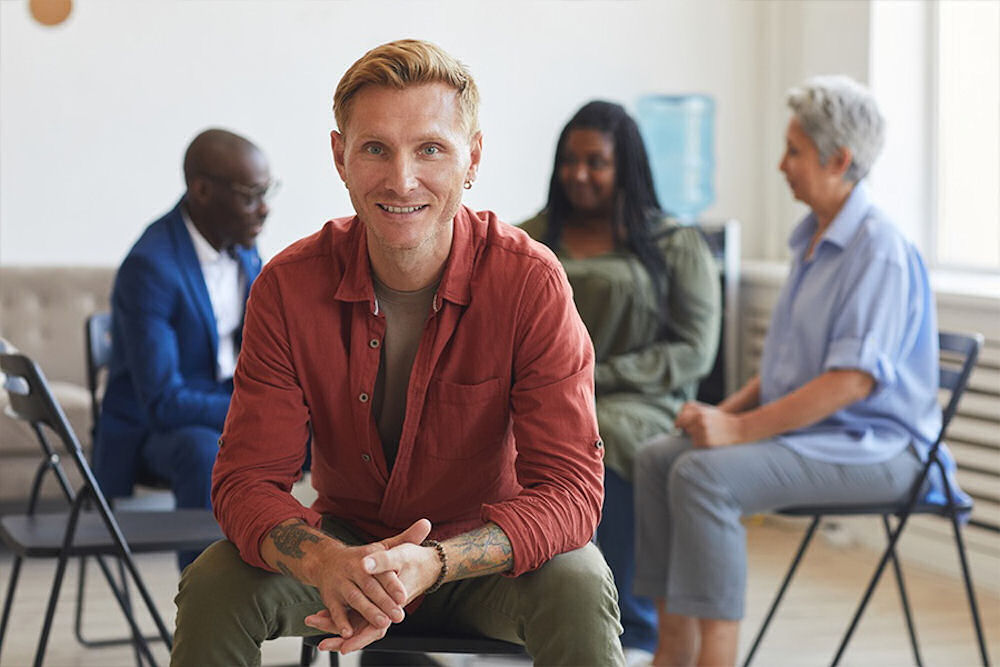Peer support is a relationship with others who have similar experiences and want to help you. In recovery, peer support is very beneficial and can ensure that you stay sober after treatment. Our recovery center understands the importance of peer support in recovery and makes sure that you feel supported by the staff and your peers while receiving treatment in one of our programs.
What is Peer Support in Recovery?

Peer support in recovery is similar to having a sponsor for alcoholics anonymous or another type of addiction group. A peer supporter is someone who has been successful in overcoming addiction and offers guidance to others who struggle with addiction. They can offer support in the real world outside of rehab when you’re ready to leave inpatient treatment.
Getting peer support is an important step in recovering from addiction. It helps you to be accountable for continuing treatment outside of rehab. Peer support is also an important step of recovery that contributes to staying sober. A recovered addict can provide valuable insight into how to live and stay sober.
Peer support is available in some treatment centers. You can find peer support if you attend group therapy. But peer support is most important to have in recovery after you complete a treatment program for addiction, so you can stay on the right course to recover.
What Does a Peer Supporter Do?
A peer supporter in recovery can do many things to help you and other recovering addicts stay on the path to beating addiction. It’s helpful to learn what a person may do for peer support during recovery, so that you can know what to expect. After you recover, you may also consider offering peer support to help others.Here are some things a peer supporter may do for or with you:
Advocate for People in Recovery
A primary aspect of providing peer support is advocating for people receiving addiction treatment. This may include building awareness of issues relating to addiction recovery. Peers may also advocate for people in recovery by sharing personal stories of their recovery journey and recommending facilities where they received treatment.
Sharing Resources and Building Skills
Your peer supporter may share resources with you that help stay sober or integrate back into society after receiving treatment. After attending rehab and overcoming your addiction, it can be difficult to try and live a normal life. In our group therapy, we teach you to develop skills to cope with addiction and your mental health, but a peer supporter can help you continue to build these types of skills.
As someone who is recovered from substance abuse disorder, peer support can also teach you life skills such as creating a routine that supports sober living.
Build Community and Relationships
Someone offering peer support builds a community of people with a similar experience. This sense of community is very beneficial as a person in recovery because then you have people who understand your thoughts and feelings.
Building relationships with others who are recovering from a substance abuse disorder can ensure that you don’t feel isolated after rehabilitation treatment. Feelings of isolation may put you at higher risk for a relapse. So many include peer support in their relapse prevention plan so they can avoid this from happening after they do the work to overcome addiction.
Lead a Recovery Group
It’s not uncommon for recovering addicts to attend group meetings after attending rehab. Peer supporters sometimes organize and lead these recovery groups to help people stay on track for their sobriety. This provides those who are recovering with a space to talk about how they’re coping. It can be a good idea for you to follow up on your addiction treatment by attending meetings so that you can learn about how others are dealing with living sober.
Mentor Others in Recovery
One role of a person offering peer support is mentoring. This may include check-ins with those recovering to provide accountability or more direct guidance and advice on how to manage your recovery. As someone who has been through the same process, a peer supporter is well-equipped to mentor others on how to stay sober and avoid triggers.
You can ask your mentor questions and talk to them about the struggles you may have with your sobriety. A mentor may also help you connect with others who are on a similar road to recovery.
Help Set Sobriety Goals
Part of mentoring may include setting sobriety goals with you. This is a great benefit of peer support while you’re recovering. Setting goals will help you adjust to a sober lifestyle. Goal setting can also motivate you by helping to achieve specific milestones. Even small wins can provide you with optimism to continue in your recovery.
Supervise Other Peers
Someone who has remained sober for several years may supervise and help train others who offer peer support. Working with a veteran of rehabilitation and addiction recovery enables you to learn techniques that are most useful in the real world. Supervision can also ensure that peer supporters understand their responsibilities.
Develop Resources
Peer support in recovery may develop resources for others who offer or seek peer support. This may include schedules for meetings, information on where to find support, Q&As, and more. These resources are created by someone who experiences the challenges of recovery and wants to teach others on how to stay sober.
Having resources for addiction treatment and recovery can make the difference between staying sober and relapsing. A peer supporter may make their resources available online or present them in person during a group meeting.
Educating the Public and Policymakers
Education is vital in addiction recovery. It’s important for families, friends, and the community to understand that addiction is a disease and that they can help in the recovery process. By educating the public and people who write policies or law, people further the efforts to gain peer support for recovery.
Educating the public and policymakers can also help raise awareness and funding for addiction treatment. This provides resources to those in need.
What Does Peer Support Look Like?

Peer support can look like other relationships in your life. It closely resembles a friendship in the way you may spend time with a peer recovering from addiction. For example, peer support takes form in these activities:
- Talking on the phone
- Taking a walk
- Send a text or email message
- Aiding in home responsibilities like cleaning
- Sharing a meal together
- Attending meetings together
Peer support isn’t a professional service but it’s often a benefit of attending rehab. Many rehabilitation facilities can help you connect with other recovering addicts. Spending time with someone who has been where you are and understands the road to recovery can help achieve some normalcy.
What are the Benefits of Peer Support for Addiction?
Peer support for addiction offers many benefits. The most notable benefits of peer support in recovery are that it reduces the rate of relapse in recovering addicts and increases treatment retention. Here are the top benefits of peer support for addiction:
Reduce Drug Use
Peer support helps reduce drug use. This is because, as a recovering addict, you have someone to talk to who understands your struggle. Those offering peer support also want to ensure that you don’t relapse. Having support also reduces negative feelings that can sometimes trigger drug use, such as isolation or anxiety.
Decrease Relapse
When you have peer support, you’re less likely to use drugs again and relapse after receiving addiction treatment. In addiction recovery, relapse is not uncommon and recovery takes time. Peer support helps you maintain your goals and stay sober.
Learn from a Mentor
Those offering peer support may become a mentor to you. Outside of rehab, a mentor can help you set goals and develop a plan to achieve them. For example, a mentor can help you get to meetings and learn coping techniques.
Make Friends
Seeking peer support in recovery is a good way to make friends. You can connect with people who have had similar experiences. Addiction can cause relationships to deteriorate so it’s very helpful to be able to make new friends in recovery. Through these friendships, you can develop skills to help improve other relationships in your life.
Become More Accountable
Peer support in recovery encourages you to be more accountable for your sobriety. By attending meetings or just by having a relationship with another recovering addict you can make sure you’re still working on your recovery. Peer support often helps celebrate your milestones in recovery and helps you keep track of your goals.
Reduce Stress on Family
If you have peer support, this can reduce stress on your family members who may feel responsible for ensuring that you stay on your path to recovery. Since they may not fully understand what you’re experiencing, it may be difficult for your family to relate to and help you.
While you’re receiving treatment for your addiction, your family and friends can also find support at our facilities with our family education program. Education about addiction and substance abuse disorder can contribute to your family member’s healing and repair of these relationships.
Increase Satisfaction With Treatment
Peer support offers benefits that ultimately improve your quality of life and help you keep your sobriety goals. For this reason, it increases a patient’s satisfaction with their treatment. If you’re satisfied with your addiction treatment you may be more likely to help others recover from addiction.
This may take the form of offering support to peers or recommending a treatment facility so they can also receive help. Your satisfaction with treatment obviously benefits you and may help you stay sober. But it’s also a great benefit that your satisfaction can help other recovering addicts.
Why Is Peer Support Important?
Peer support is so important in recovery because it helps you stay on track to recover from your addiction and helps you regain normalcy in your life. Overcoming addiction can be difficult and both emotionally and physically tiring. Having others that understand and support you makes a big difference.
Free by the Sea Offers Peer Support In Recovery

We know how important it is for you to feel fully supported in your recovery, so we built in peer support into our treatment programs. When you come to us for rehabilitation and addiction treatment, we provide every kind of support through a customized treatment plan, family visiting hours, education, one-on-one counseling, and group therapy.
At our recovery center, you can join a program specifically designed to fight your addiction. Contact us today to discuss your needs and how we will help you.

Dr. Richard Crabbe joined our team in 2019 as our psychiatrist and medical director. He attended the University of Ghana Medical School where he became a Medical Doctor in 1977. From 1978 through 1984, he was a medical officer in the Ghana Navy and provided a variety of services from general medicine to surgeries. He received his Certificate in General Psychology from the American Board of Psychology and Neurology in 2002.
Insurances We Accept
Free by the Sea recognizes the importance of having insurance to receive addiction treatment. Let us work with you to provide you or a loved one with premier addiction treatment services. We accept several private insurance plans. Verify your rehab coverage with us today to ensure you receive the support that you need! Find out if you are covered today!











